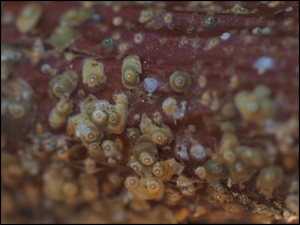
By Clint Thompson
Now is the ideal time for peach producers to protect this year’s crop against San Jose scale insects. Especially as temperatures continue to increase, so too should the numbers of scale insects invading peach orchards in the Southeast.
Brett Blaauw, assistant professor at the University of Georgia (UGA) College of Agricultural and Environmental Sciences, said it is important that growers take advantage of the trees being in a dormant state.
“Right now, there’s not much we can do insecticide wise, but while the trees are still pretty much dormant, we can apply horticultural oils,” Blaauw said. “The oils will coat the trees, and by coating the trees, you’re covering those San Jose scales. Covering the waxy layers then creates a barrier over that layer that can suffocate or smother the San Jose scale that is under that waxy layer and kill them.
“During the normal growing season when you have leaves and fruit on the trees, if you spray too much oil, the oil can actually burn the leaves or cause phytotoxic issues with both the leaves and the fruit. But right now, it is a fantastic time to do that, because there’s no leaves or fruit on the trees.”
San Jose scale is a tiny insect that has a waxy coating that covers and protects the whole body of the insect. It protects them from the environment and from other insects that would eat them.
Application Rate
Blaauw noted in his UGA Peach Blog, producers can apply dormant horticultural oils at a rate of 1.5% oil to water during delayed dormant timing. High gallons are needed to maximize coverage. Growers should aim for 150 to 200 gallons per acre for delayed dormant application to pre-pruned trees. Rates should decrease to 100 gallons per acre for trees that have already been pruned.
Growers can also combine an insect growth regulator like Centaur or Esteem with the oil to enhance control of the scale.









